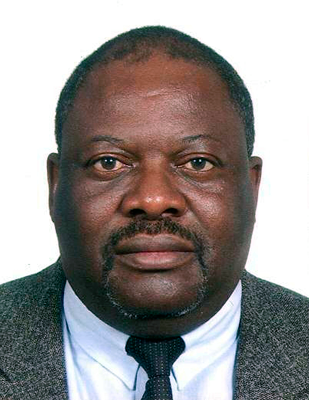- ON THE DECADE
- THE DECADE'S CAMPAIGN
- REPORTING ON PROGRESS
- THE DECADE'S PROGRAMMES
- FOCUS AREAS
-
- Access to sanitation
- Financing water
- Gender and water
- Human right to water
- Integrated Water Resources Management
- Transboundary waters
- Water and cities
- Water and energy
- Water and food security
- Water and sustainable development
- Water and the green economy
- Water cooperation
- Water quality
- Water scarcity
- FOCUS REGIONS
- RESOURCES FOR
- UN e-RESOURCES
International UN-Water Conference. Water in the Green Economy in Practice: Towards Rio+20. 3-5 October 2011
The Green Economy and... Thomas Chiramba
 "In the transition to a green economy, we should focus on the issues that matter most."
"In the transition to a green economy, we should focus on the issues that matter most."
Thomas Chiramba
Chief of the Freshwater Ecosystems Unit in the Division of Environmental Policy Implementation (DEPI) of the United Nations Environment Programme (UNEP)
Which change is necessary in the transition towards a green economy?
For me, the most important thing is that we should no longer focus on the question if the transition to a green economy is necessary or not. Instead, the key question should be: how can we transition to the green economy, given the environmental challenges that we are facing? I am very happy that the Zaragoza conference is exactly addressing this important question by highlighting case studies from around the world and showing that is possible to make a change.
In the transition to a green economy, we should focus on the issues that matter most. For me, these issues are the resources that are critical for the survival and future of mankind and for the world as a whole–water being clearly one of them. We should think about how we can use these resources in a sustainable manner and take measures to protect them so we can continue using them.
What are the most important barriers in this process of change and which tools can be used to overcome them?
The biggest barrier that is that water resources managers still focus very much on water allocation. They don't recognize that by managing water, they are in fact managing a whole range of ecosystem services. When managing water resources, we need to evaluate all the ecosystem services that we are influencing. I think it is important that the evaluation of water resources ecosystem services becomes part of all business and of what we do every day.
The tools that we are using now are the traditional water allocation tools. Since we have to recognize that we are actually managing a whole range of ecosystem services, we need to incorporate ecosystem services evaluation tools into water resources management. The evaluation of ecosystem services will assist decision makers in undertaking the trade-offs related to water resources management in an informed manner.
What are your expectations for the Rio+20 process and how can the Zaragoza conference contribute?
I hope that by the end of the Rio conference we will have clarified all the abstract concepts that are related to the green economy. More importantly, I hope that these concepts will have been translated into a practical down-to-earth document that gives guidance on how decision-makers and practitioners can transition to the green economy. The Zaragoza conference can contribute to this by showcasing case studies that indicate how the green economy can be put in practice.
>> Conference Home
>> Statements from UN Agencies
>> Video recording of sessions

>> Ch1 Water on the Road to Rio+20
>> Ch2 Challenges and opportunities for water in the transition to a GE
>> Ch3 Thematic conference papers
>> Ch4 Conference summary: Water in the GE in practice
>> Ch5 The way forward
>> A1 Water toolbox: A contribution to Rio+20
>> A2 Feedback report
>> A3 Communications report
>> Case papers by tool
>> By region 
>> Developing countries 
>> Developed countries 
>> Agenda 
>> Economic instruments
>> Green jobs
>> Sustainable financing
>> Investments for biodiversity protection
>> Water technology
>> Water planning
>> ESCWA region
>> LAC region
>> Conference daily
>> Interviews with case presenters 
>> Presentations
>> Communications articles
>> Conference media brief 
>> Daily press notes
>> Interviews with session conveners
>> Issues information briefs
>> Tools information briefs
>> Banners
>> Reader on water and the Green Economy 
>> Conference poster 
 >> Discussion forum
>> Discussion forum
 >> Twitter
>> Twitter
>> Water, energy and food security
>> Spanish Business Dialogue
>> Stakeholder dialogue on the Green Economy in Spain
>> Technical visit
>> Organizers
>> Participants
>> Conference committee
>> Rationale
>> Tools
>> Expected outcomes
>> 2nd UNCSD PrepCom
>> Road map to Rio+20
>> Key questions on GE
Copyright | Terms of use | Privacy notice | Site Index | Fraud alert | Help





